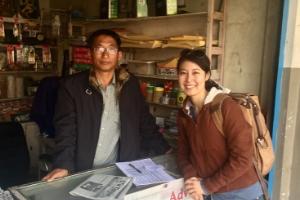Research
Engaging in Research Abroad

For Min Kim the path to a Ph.D. all started with a book, James Scott’s The Art of Not Being Governed. Min has always been fascinated by topics related to conflict and state-building. One day, while working as a program officer at the UN Migration Agency in Bangkok, she picked up James Scott’s book. In it, Scott explored the idea of mountainous frontier zones spanning Southeast to South Asia populated by those who have historically resisted state expansion. Scott’s provocative thesis captivated Min’s imagination leading her to apply to the SIS Ph.D. program to pursue these ideas for herself.
Min is currently working on her dissertation which examines the causes and mechanisms of state-building processes in the border highland regions of South and Southeast Asia. The most common approach to state-building focuses on whether the state center has sufficient capacity and willingness to project power to the peripheral territories. Min’s project takes a different approach. She explores the idea that political friction (or dynamics?) between diverse peripheral actors influence the center’s state-building efforts in border regions.
“The basic idea is that some local actors in the border areas who are in competition with others might be compelled to make an alliance with the state center to overcome their own political constraints against their rivals. State governance is extended through this alliance made between some periphery actors and the state center, resulting in uneven process of state-building in borderlands” Min argues. To validate this claim, she is combining extensive field interviews and archival research on the border highland states of northeastern India and northern Myanmar.
Min states that it is too early to tell whether she has found sufficient evidence to evaluate her argument. However, a story that is emerging from her fieldwork in India’s northeast suggests that the center's state-building activities in this border area is deeply mired in local politics. “Nagaland, for instance, is comprised of at least sixteen major tribes and each tribal community does not have equal power and influence nor have similar interest towards state incorporation. I am learning every day how these tribal divisions are deeply ingrained within Nagaland society and politics,” Min explains. She plans to probe further whether similar localized politics influences state governance in other borderland cases.
Min recently completed her fieldwork in India and is in the process of transitioning to her second major case study, the two hilly states of northern Myanmar. She spends most of her days conducting interviews with local journalists, academics, ex-combatants, and political and social elites. When she is not doing interviews, Min visits the local archives to collect government documents and news articles. Sometimes, she walks around town to make small talk with people on the street to learn their perceptions on the state. She also travels to remote districts to learn through first-hand experiences of local bureaucrats who are involved in implementing various state activities – the key to understand the machinery of government.
Upon graduation, Min would like to pursue an academic career. “I would like to devote my life to advancing the field of knowledge and teaching my favorite topics of all time – state, war, and politics,” she states.
